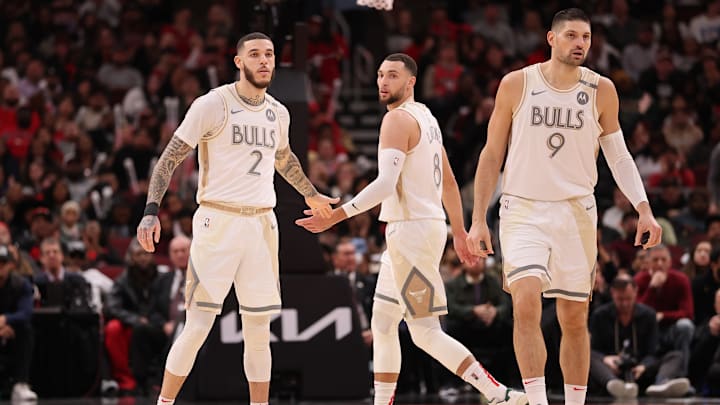It's time for some reflection ahead of one of the most anticipated days of the regular season—the, dare I say, overhyped trade deadline. Instead of focusing on the many hypothetical trade scenarios and rumored player destinations, we'll revert to the actual trades that shaped the Chicago Bulls today.
Almost forgotten is how much of the current Bulls squad was assembled. Five players, including stalwarts Zach LaVine and Nikola Vucevic, were acquired via trade. Furthermore, Lonzo Ball, Josh Giddey, and Chris Duarte came to the Windy City by way of trade.
The Chicago Bulls have been built by trades
The Bulls' assembly began in 2017. Chicago sent All-Star Jimmy Butler to the Minnesota Timberwolves in exchange for LaVine, Kris Dunn, and the seventh-overall pick, Lauri Markkanen, who would later become an All-Star for the Utah Jazz. Although the trade sparked a full-fledged rebuild, it was an excellent haul for a disgruntled up-and-coming talent.
Chicago struggled after ditching Butler and acquiring LaVine, who had suffered a torn ACL in February of 2017. From 2017-18 to 2019-20, the Bulls won merely 71 contests. Following the end of the 2019-20 campaign, Chicago hired ex-Oklahoma City Thunder coach Billy Donovan, beginning a new, competitive era.
During a middling 2020-21 campaign, the Bulls made a substantial move, trading recent lottery pick Wendell Carter Jr., Otto Porter Jr., and two first-round picks to the Orlando Magic in exchange for Nikola Vucevic and Al-Farouq Aminu. The acquisition of Vucevic didn't immediately pay dividends, but it would help in the long run.
Five months later, the Bulls initiated a sign-and-trade to bring Lonzo Ball to Chicago. Three days later, Chicago followed suit, executing a sign-and-trade with the San Antonio Spurs to acquire swingman DeMar DeRozan. In a matter of months, the entire Bulls' roster received a complete makeover.
Adding Ball and DeRozan to a core of LaVine and Vucevic appeared genius. Chicago owned the best record in the Eastern Conference halfway through the 2021-22 season. Suddenly, everything came crashing down as Ball suffered a torn meniscus and bone bruise, which led to the ascending guard opting to undergo season-ending surgery. The Bulls would subsequently fall from first to sixth place by the time the postseason began.
The following two seasons were mired by mediocracy. Without Ball, the Bulls mustered 40 wins in 2022-23 and 39 in 2023-24. The front office would come to the conclusion that another shake-up was necessary to jumpstart the lagging franchise. The Bulls traded two-time All-NBA defender Alex Caruso for Josh Giddey in June 2024. A few weeks later, Chicago agreed with the Sacramento Kings to a sign-and-trade that would send DeRozan to Sacramento in exchange for Duarte and two second-round picks.
Trading to improve is no longer a viable option
If the Bulls' recent history has taught us anything—the front office sees trades as an avenue to improve. This one-sentence sentiment is likely the reason why Arturas Karnisovas and Co have been reluctant to trade LaVine and Vucevic despite months of considerable trade chatter.
Trading both former All-Stars suggests the Bulls are taking a step back rather than forward. However, at this juncture, that's what needs to be done. Chicago's current roster construction has failed to take advantage of a weak Eastern Conference. The Bulls are currently in 10th place in the East and are likely to fall to 11th in the coming days.
Instead of aiming to improve the roster via trade, the best and most logical long-term outlook is quite the opposite. Worsening the roster by discarding key veterans in exchange for draft compensation and expiring contracts is the only way to revamp a mediocre roster.
